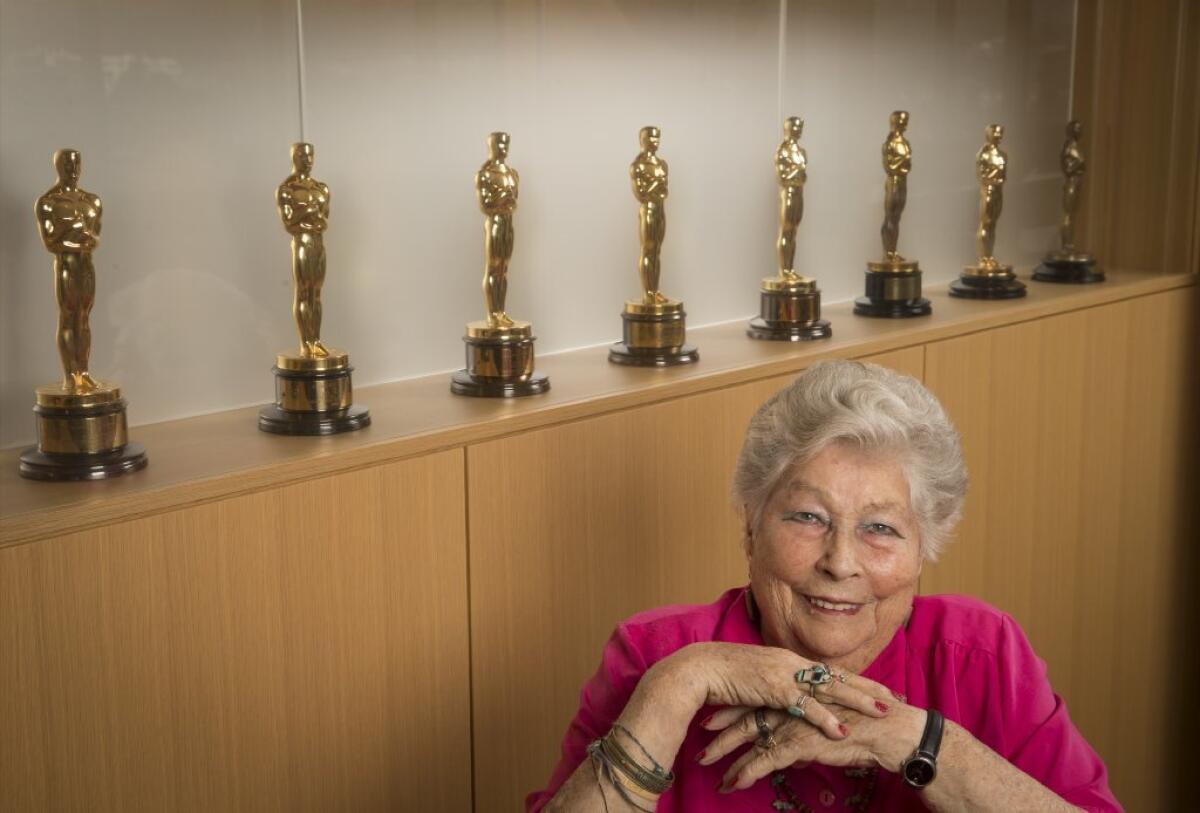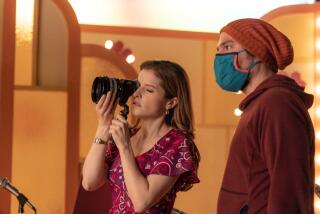From ‘Lawrence of Arabia’ to ‘Fifty Shades of Grey,’ Anne Coates is Hollywood’s premiere editor

The Academy of Motion Picture Arts and Sciences will give an honorary Oscar to British film editor Anne V. Coates on Saturday. Coates, 90, who won an Oscar for her work on “Lawrence of Arabia” and was nominated four more times for films such as “Becket” and “Out of Sight,” was cutting films as recently as last year, when she worked on Universal’s “Fifty Shades of Grey.”
In an interview at the academy in October, Coates shared how she edited drunken actors’ mistakes out of classic films, added some steam to “Fifty Shades” and forged a ground-breaking career in a male-dominated field.
What was it like to be a young woman in England during World War II?
I was born with a silver spoon in my mouth. We lived in quite a large house, in a very lovely market town in Surrey called Reigate. My father used to wear a bowler hat to go to work. He was an architect and helped to build up London during the war. One of my first memories was watching the parlor maid iron the London Times so there were no crinkles in it before my father read it.
My grandfather was very Methodist. He made bread. Due to my uncle Jimmy, we never had bread rationing in the war. He foresaw what was going to happen and stocked up in 1936 or ’37. My other uncle was Arthur Rank, who ran Pinewood, Shepperton and Ealing studios at one time. When I wanted to go into films, my uncle wasn’t keen. He thought I was going in for the glamour, and to have affairs with actors.
Was that true?
No! It did happen, but some years later on. I went into nursing instead. I was a Red Cross nurse. We were called VADs — Virgins Awaiting Destruction. I was the lowest form of nurse, taking the bedpans, and I met a kind of different person than I had before. Because I was a bit snotty growing up. I met all these new kind of people who taught me about the left wing. I turned up at my mother’s tea party dressed all in red and said, “I’m a Communist now.” I dabbled with it but I never joined the party.
Eventually I managed to persuade my uncle to put me [to work] in film and he put me in religious films. He thought, “That’ll cool her down.” Didn’t work. I made the tea and coffee and was a projectionist. I heard of a job going at Pinewood for an assistant in the cutting room. I went for an interview. I hadn’t even really been in a cutting room on a feature film but I wasn’t about to say that ’cause I wanted a job. They said, “Can you do opticals?” “Oh yes!” I said.

Directors often like an editor to be a sounding board. How did you like that part of the job?
I used to have to get my courage up to offer my ideas to David Lean, but that improved as time went on. He used to say to me, “That’s a ridiculous idea, I’ve never heard of such a thing.” And I would feel awful. But then he would come up to me a day or two later and say, “You know that idea you had, it’s not exactly that but it’s close.” It was always worth putting up the ideas. I’m not crushed if they don’t want to use them, it’s a point of view.
How hard was it for you to adapt to editing digitally?
At my age it was quite difficult to do — I was midcareer. I kicked the machine quite a lot. I learned Lightworks. Then when I went on “Out of Sight,” Steven Soderbergh wanted me to use an Avid. I thought, “Oh no, I don’t want to learn another one,” but I wanted to work with Steven so I started learning.
I was chatting with George Clooney on the set and I told him how much trouble I was having. But I told George I realized that they’re really just the same. It was just a question of calming down and cutting just like I had before. Telling the story. Making it funny. Saving the actor’s performance. George thought that was funny. He screamed with laughter. Jennifer Lopez, who was the female lead, came by and George said, “This is the editor Anne Coates who is going to save your performance.” Jennifer did not think it was funny.

You’ve edited some very steamy films — “Unfaithful,” “Out of Sight” and, more recently, “Fifty Shades of Grey.” Are there any secrets to a great love scene?
On “Unfaithful,” it was hard watching Diane Lane with [director] Adrian Lyne. He would push her and push her and push her on the same take. Sometimes she got upset with him but he got a wonderful performance out of her. When I watched him I would wince, thinking, “He’s going a bit far.” She did burst into tears a couple of times.
I’m very open. I tried to make “Fifty Shades” a little more sexy, but they were worried they wouldn’t get the R rating. I would have had her trussed up like a suitcase and hoisted to the ceiling. I tried and tried to get that in. They used to laugh at me. Generally speaking, their kissing was a little lukewarm. I wanted more passion. But the audiences liked it.
I was exhausted by the end of it. In a way I’ve given up editing. I talked to my agent this last week about lecturing on cruises. I think that would be a lovely thing to do. I know the stories people like, about Richard Burton and Peter O’Toole having a bit of noggin.
What did the outtakes of the two of them from “Becket” look like? Just empty bottles?
Oh, on the beach, they were having a real problem sitting on their horses. It’s a beautiful shot of the beach and I go from a very long shot of galloping into a big head. I had fun with it, but it was difficult. Because they were flubbing their lines, we had to shoot over two days. The clouds are there one day but not the next, and nobody notices that because the actors are so magnetic. The horses were perfectly well behaved, but it was mainly the boys who were trouble.
Editing is one of the more solitary jobs in a very collaborative medium. Do you like the solitude?
I love cutting my first cut alone. I used to love a Movieola. It was very personal to me. I shoo people out when I’m cutting. I don’t find it lonely, I find it personal. But at the beginning of a film, I’d always think, “Oh my God, I’ve lost my touch. I’m going to get fired.”
When you started out, you wanted to be a director. Why did that change?
Because I had children, mainly. As a director, the film stands still if you’re not there. As an editor, if my children were ill I could go in an hour late and no one would even know as long as I was up-to-date. I don’t think I hardly missed a dance thing or a swim thing for the children. I found that being an editor and a mom worked very well. There are lots of directors who are moms, but for me I couldn’t have coped with both very well. I had to turn down some really good films. When Franco Zeffirelli offered me “Romeo and Juliet” he wanted me to pack up and be there the next day. Well, if you’ve got three children in school and a husband, you can’t do that.
There used to be many more women editors in the early days of film. Why did that change?
I have thought about this. Did the men squeeze them out, as the job became more important and better paid? Editors weren’t that important in those early days. They mostly cut the negative. There were quite a few women directors too. I don’t know why they went away. When I first came in I wanted to be a director and then later on I had opportunities to be a director and turned them down, because I was married to a director. I never edited for my husband. He did ask me to, but I think if you’re there all day working on something, you want to be able to go home and say, “I just worked with that idiot director and guess what he did today!” You can’t do that if you’re married to him.
More to Read
Only good movies
Get the Indie Focus newsletter, Mark Olsen's weekly guide to the world of cinema.
You may occasionally receive promotional content from the Los Angeles Times.











